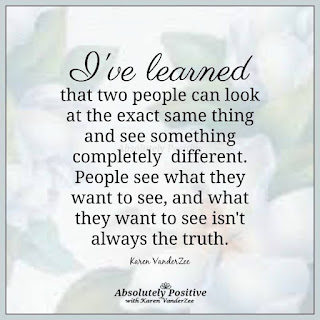Detachment Is a Spiritual Awakening
“Happiness
is a byproduct of the way we live our own lives,
not
the way others live theirs.”
Karen
Casey, Codependence and the Power of
Detachment
Detachment
is a major buzzword in codependent recovery circles. So what is detachment? It’s
the process of realizing that we are enmeshed in the lives of others, admitting
that we are powerless over them and then making the conscious choice to separate
or detach ourselves from the people whose lives we’ve been trying to live. Part
of losing ourselves in those people involves the need to control them. We
mistakenly believe that if we can control them and make them be and do exactly
what we want, we will finally be happy.
This
type of codependent thinking, believing that our happiness is the byproduct of
how other people live their lives, is modeled perfectly by Hannah, the character
from the movie Pilgrimage that I wrote about yesterday. She was so enmeshed in
her son Jim, so caught up in the belief that her happiness was dependent on
controlling his life, that she bled the life out of the person she loved most.
Eventually,
as the film Pilgrimage progresses, Hannah has a spiritual awakening in
France. She meets a young man named Gary, who is very much like her son Jim.
Through Gary, Hannah learns that even if a son doesn’t always act the way you
want, or do the things you demand, he is still lovable and you can still be
happy. She learns that Gary’s behavior is about Gary and that Gary has to meet
his own needs for happiness. You see, Gary’s mother is as much enmeshed in Gary
as Hannah was in Jim.
Like
Hannah, Gary’s mother has been living vicariously through her son, and she
doesn’t approve of the girl he has chosen to marry. She has made Gary’s life so
miserable that when Hannah meets Gary, he’s drunk and seems to be considering
jumping from a bridge. In encountering Gary, Hannah has the spiritual
whereabouts to be concerned for his safety, but to refrain from caretaking him.
As
Hannah hears Gary’s story, she sees how it parallels Jim’s, and she sees the
errors of her past behavior. She comes to understand that her happiness wasn’t
dependent upon Jim and the way he chose to live his life. She comes to
understand that Jim had enough love for both her and Mary, the girl he loved.
And she comes to understand that her very own controlling behavior destroyed Jim’s
happiness, Mary’s and her own.
When
Hannah meets Gary’s girl, Suzanne, she is able to treat Suzanne with all of the
love and understanding that she was never able to share with Mary. Hannah is
then determined to intervene with Gary’s mother and she does. She helps Gary’s
mother to see that she has been enmeshed in Gary the same way Hannah had been
enmeshed in Jim. She also helps Gary’s mother to see that Gary has a right to
his own happiness and that her happiness is not dependent upon Gary or how he chooses
to live his life. And that if she doesn’t detach, she will lose Gary while
destroying any chance she may have for true happiness.
Before
leaving France, Hannah goes to the military cemetery where Jim is buried. She
falls down on her hands and knees and begs Jim for forgiveness. Her eyes have
been opened and she is willing to throw her pride aside and make amends in the
only way she knows how. On returning to Arkansas, she goes to Mary and asks
Mary for her forgiveness. The two of them have a good cry and then Hannah
reaches out to her only grandson, Little Jimmy. Everyone is reconciled and
their world is back on track toward lasting happiness.
Our
happiness truly is a byproduct of how we choose to live our lives. We never
find happiness through trying to live the lives of others. If Hannah had
learned these lessons sooner, maybe she and her family would have experienced
happiness beyond compare. We’ll never know. It was too late for Jim to be part
of that happiness, but it was not too late for Hannah, Mary and Little Jimmy.
And
it’s never too late for us either. If you are trapped in the belief that your
happiness revolves around the life of someone else, it’s time to detach and to
let go of that belief. You cannot ensure your happiness by trying to control
the behavior or the lives of others. So, it’s time to realize that no one can
provide you with the happiness that you can only experience through living your
own life—and no one else’s life.
People
we love—and maybe have enmeshed in—can be beautiful parts of our lives and they
can add to our happiness. But they cannot be the foundation for our happiness.
We have to be the foundation of our lives and our happiness. Once we are, we
can enjoy the love and happiness others share with us. And as we share with
others, we will find that their happiness compliments the happiness we already
posses in-and-of ourselves—and all is well.




Comments
Post a Comment